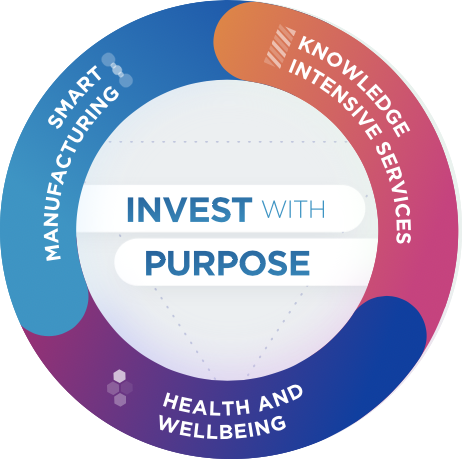The year 2020 is a time that most countries would like to put behind them, but for Costa Rica, despite the hardships, it will go down as a year to remember. As the COVID-19 pandemic struck, a veil of uncertainty dropped around the globe, both in life and in business. Nevertheless, Costa Rica was able to respond to this challenge and attain record figures in terms of foreign direct investment and job generation; a total of 81 investments, 55 being re-investments from already established multinational companies, and 26 entirely new investments from 11 different countries. More than half of these new investments came from non-traditional markets such as Japan, Denmark, India, Bosnia, and the UK. Additionally, almost 20,000 new jobs were generated in 2020, an 18% increase from 2019.
This stunning achievement should come as no surprise; Costa Rica is a world renowned, sough-after, nearshoring destination, with a proven track record for multinational companies that not only want to grow but want to do it in the best way possible. “Sustainable productivity” is the term coined by CINDE, Costa Rica’s Investment Promotion Agency, to describe this growth mindset. “Costa Rica’s commitment to sustainability is our flagship to develop the right conditions for multinational companies that are looking to invest with purpose,” says Jorge Sequeira, director of the 4-time award winning #1 IPA of the world by the United Nations’ International Trade Centre. This sustainable productivity is reached by leveraging 3 pillars: people, planet, and prosperity.

PEOPLE: Costa Rica’s greatest resource
Costa Rica abolished its army in 1948. It was decided that the budget allocated for this activity would be redirected towards education, health, and infrastructure. This mindset is still tangible in the country’s decision making, as it invests 7.4% of its GDP in education, which is free, universal for boy and girls, and mandatory since 1870. This unique approach has reaped its benefits, as Costa Rica is the #1 Latin American Country in Workforce Skills and Quality Education according to the latest World Economic Forum’s Global Competitiveness Report. According to the same publication, the country is also #1 regarding Skills of Current and Future Workforce in Latin America as well as Digital Skills of the population.
Although the country already has a remarkable talent pool, it keeps an eye on the future, and continuously updates its productive population thanks to CINDE’s constant gap analysis, where the threshold between what companies need and the curricula offered by the national educational institutions is addressed.
The latter has given way to a digitally savvy, creative, and innovative workforce, which makes Costa Rica a digital epicenter in Latin America, delivering over 100 different business functions in more than 12 different languages to all parts of the world. Currently, over 85% of knowledge-intensive services exports are delivered in English from Costa Rica to the world.
Given the constant strengthening of its unmatched human talent, it is only natural for multinational companies to continue allocating more of their resources and business towards the country.
“Costa Rica’s commitment to sustainability is our flagship to develop the right conditions for multinational companies that are looking to invest with purpose”
Jorge Sequeira, Managing Director, CINDE
PLANET: Growing business naturally
Costa Rica has adopted sustainability and the safe keeping of nature for over 60 years. An astounding 99% of the country’s power generation comes from renewable resources such as air, wind, and water, which takes special relevance for companies looking for carbon neutrality. Additionally, the government declared its National Decarbonization Plan, which sets the goal of achieving carbon neutrality by the year 2050. Such initiatives have yielded into the establishment 25 RE100 companies in the country.
Additional examples of this seasoned regard towards nature are evidenced in Costa Rica’s Protected Areas System, which places 26% of Costa Rican territory under schemes such as national parks, conservations, and natural reserves; these measures make perfect sense in a country which is 52% covered by forest and holds 6.5% of all the world’s biodiversity.
Furthermore, a group of already established multinational companies are deeply committed to economic, social, and governance (ESG) standards. This collection of companies includes AstraZeneca, GlaxoSmithKline, Intel, Microsoft, McKinsey & Company, Procter and Gamble, and Edwards LifeSciences. These companies have ambitious sustainability goals set for 2030. For example, Microsoft aims at being water positive and carbon negative, as well as being zero waste. AstraZeneca also aims at carbon negativity, and GSK has the goal of being net-zero impact on climate: all by 2030.
PROSPERITY: A thriving, interconnected business ecosystem
Parallel to all its natural richness, Costa Rica has become an ecosystem of another sort: a technology-enabled, collaborative ecosystem, where multinational companies can thrive and innovate thanks to a dynamic mix of resources and capabilities.
Costa Rica’s strong track record is visible in the more than 320 companies established in the country across a vast array of industries: corporate and business processes, creative industries, digital technologies, manufacturing, tourism infrastructure, wellbeing, and life sciences. Within these industries, the names of big players and leaders can be found; Intel, Amazon, Microsoft, Accenture, Boston Scientific, Roche, Cargill, and Bayer, to name a few. These and other companies have reinvested in the country over several years, with expansions aimed at increasing their headcount, as well as adding more value-added processes to the initial functions they started out with in the country.

A recent example of such an expansion comes from Intel, which in December 2020 announced a $USD350 million investment to restart the assembly of testing of microchips in Costa Rica. This will enlarge Intel’s high-value R&D center, the largest in Costa Rica and the only one of its kind in the world. The company has also established a Global Services Centre, responsible for designing and optimizing business processes across the company. “The existing infrastructure, synergy with the test operations that already exist on-site, the talent, the free trade zone regime, and legal environment gave Intel a favorable option to start its assembly capacity in Costa Rica”, claims Ileana Rojas, General Manager of Intel. Such statements are frequently heard from many other top-level executives, which have been able to detect that the Costa Rican talent is the most sought-after, valuable resource the country hast to offer.
Michael Tucci, the CEO of MicroTechnologies, has witnessed this holistic setup, as his company has operated in Costa Rica for more than 23 years. “I think there’s really a combination, maybe there’s not one specific item / ingredient but when you look at the combination of proximity, of stability, of rule of law, transparency of government, logistical access… It really all combines into a very unique value proposition…”, he states. This unique mix entices key factors such as a competitive incentive package, the creation and organization of industry clusters, and a set of strategic alliances between the public and private spheres; the perfect breeding ground.
The first factor, the Free Trade Zone Regime, comprises the set of incentives and benefits granted by the Costa Rican government for multinational companies that invest in the country. These allows companies to have a much more favorable financial outlook to begin their operations, reaching true ROI.
The second factor is Costa Rica’s cluster strategy, which connects multiple players across the country. As of today, clusters in the fields of med-tech, biomed, cybersecurity, and aerospace have been forged. A special mention must be done for the life sciences sector, where the Costa Rican government, once again, through its forward-thinking approach, declared the Life-Centered Hub Initiative, which states that all entities dedicated to life sciences, wellbeing and innovation should be considered of national interest. This acknowledges the importance of this sector for the Costa Rican economy; it also serves as a first demonstration of the Costa Rican government’s goal to become the #1 hub for Life Sciences in Latin America. In 2020, the med-tech sector alone exported $3.9 billion. This is due to the presence of 9 out of 20 of the world’s top global OEMs in the cluster, which also includes more than 70 other med-tech companies.
The smart manufacturing sector itself exports more than 4,400 different products to 155 destination countries. This wide range of destinations is possible due to a permanent commitment to improving market access for Costa Rican products by means of trade liberalization, as the country is an active participant within the World Trade Organization framework. This commitment is reflected in its participation in several Free Trade Agreements which comprise trade with 50 commercial partners, including the European Union (a total of 27), the European Free Trade Association (4 additional European countries), United States, Canada, Mexico, Chile, China, Singapore, and others, which collectively represent 93.4.% of its exports.
Moreover, not only is this ecosystem open to the world, but also adaptable to the most enduring challenges, as it proved to be when the pandemic struck. Costa Rica was able to ensure business continuity and avoid business disruption thanks to bi-weekly round tables between the Ministry of Foreign Trade, the Costa Rican Foreign Trade Promoter (PROCOMER), and CINDE with over 26 different business chambers to address challenges. The swift decision making from these private-public collaborations allowed the implementation of remote work across all multinational companies in record time. In a matter of days, 98% of service companies were 100% working from home, a feat which entailed 70.000 people. Even operations related to life sciences or advanced manufacturing companies suffer no disruption at all. This continuity was also reflected in Costa Rica’s exports, the least volatile of the Americas during 2020, according to UNCTAD’s 2021 Global Trade Update with a 0.03 score (where zero is the least volatile). This rating was equal to that attained by the USA, with only Japan (0.02) and the EU-21 (0.01) faring better.Altogether, Costa Rica was able to have a record year despite the pandemic thanks to the adaptability and responsiveness of its well-orchestrated corporate ecosystem; one where a wide range of different entities, capabilities, and resources come into play to make sure multinational companies can grow, thrive, and innovate under a mindset of sustainable productivity. An ecosystem where companies can grow better, instead of growing at all costs.
More information visit www.cinde.org

